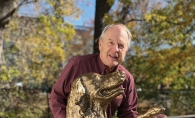Their competitive cores are as solid as the ice they first skated on. That foundation on hockey rinks in Edina and Bloomington has led Keri Herman, a freestyle skier, and Brian Burke, the director of player personnel for the USA men’s hockey team, to career heights in athletics this month as they participate in the 2014 Winter Olympics in Sochi, Russia.
“The Olympics are Broadway,” says Burke, a leader of the U.S. national team dating back to 1993. “A lot of people can play major roles off Broadway, but when you’re on Broadway, it all counts and everyone’s watching.”
We will be watching as Herman and Burke represent us, as Americans and as Minnesotans. To better understand what we will be rooting for, we must understand what defines and motivates them.
Thrill of Competition
Herman, who was born in St. Paul, moved to Bloomington at age 5. She played varsity hockey for Jefferson High School in seventh and eighth grade and then for St. Paul United, which teamed with St. Paul Academy, for four more years. The goal-scoring center “retired” from hockey when she went to college at the University of Denver.
She was skiing in Colorado at age 21 when she realized what she had been missing since hanging up her hockey sweater.
“I did my first rail,” she says. “It was so fun and I was instantly addicted. … It was the challenge. … Getting back to being athletic again and being able to work for something. It was really fun and was filling a void that I didn’t realize I even had since high school.”
On that rail, she fell—again, again and again.
“It gave me more determination to succeed,” she says.
Burke, born in Rhode Island, moved to Edina at age 12. His family of 12 was stranded at the Howard Johnson hotel as the moving truck was delayed. So he sat and watched the Minnesota State High School hockey tournament on TV.
“It’s a game that I fell in love with before I started playing,” he says.
Then Burke started playing—all the time. Thanks to outdoor rinks in Edina, he played after school and then again after dinner and homework. He played all day on Saturdays. He played bantam house as a first- and second-year bantam. His junior year, he was assistant captain on the Midget A team.
“The defining line for me was making that Midget A team,” he says. “The thing that gave me a boost is when they said I was going to be one of the captains. I thought I had snuck onto the team.”
The split of Edina High School in 1972 allowed Burke to make the Edina West team as a senior. The following year he played Division I hockey at Providence College.
Taste of Success
Herman enjoyed success at some local contests near her adopted hometown of Breckenridge, Colo., and secured her first sponsor. They said they would pay her way to Aspen and the entry fee for a slope-style contest against other professionals in 2007.
“I was competing against other professional girls and I didn’t really even know that I was at the caliber to compete with them,” the 30-year-old recalls. “It was an awesome feeling.”
Her career took off from there with four X Games silver medals and the Crystal Globe, which is given to the overall world cup champion. She joined the Olympic freestyle skiing team when it became an official sport in the games two years ago.
During his senior year at Providence, Burke played a few games in the American Hockey League after the season eneded. He signed with the Philadelphia Flyers and played for that system’s AHL team, the Maine Mariners, but then went to law school at Harvard and practiced law for six years in Boston. In 1987, he became an assistant general manager for the Vancouver Canucks, which led to continued hockey involvement.
As general manager for the Hartford Whalers in 1992, Burke was picked to manage the U.S. World Championship team. Soon after, he suggested that a committee of general managers pick the national teams. Starting in 2007, Burke was an original member of the U.S. Men’s National Team Advisory Group. In 2010, the U.S. Olympic team took home the silver medal at the Vancouver games, and in 2013, the national team won bronze at the International Ice Hockey Federation Men’s World Championship, the third medal for the Americans in that event since 1962.
“I believe a group of people is always smarter than any one or two people,” the 58-year-old says. “I said let’s harness the power of a max number of GMs.”
Among the current group of eight leaders, Burke, now president of hockey operations for the Calgary Flames, has helped scout and assemble this Olympic team.
The Cause
Herman’s right hand has a tattoo reading, “HI 5.”
“It was just having fun with my friends and not taking anything too seriously,” she says. “Just goofing around and remembering to enjoy the little things in life and having fun all the time.”
Part of Herman’s inspiration to enjoy every day comes from Canadian Sarah Burke, a skier who died after sustaining brain injuries on a half-pipe in 2012.
“She was awesome,” Herman says of her former teammate on the racing circuit. “She was always someone who pushed the envelope and pushed the bar for girls skiing, so I definitely think about her all the time and what I can do to help progress the sport and keep it where it’s going.”
The topic of human rights has swirled around the Sochi games after Russia passed a law outlawing “propaganda of nontraditional sexual relations among minors.”
This is a very personal issue to Burke.
Burke’s son Brendan came out to his family as a gay man in 2010 and was killed in a car accident a few months later. In 2012, Burke’s other son, Patrick, started You Can Play, a group that encourages young male athletes, regardless of sexual orientation, to continue playing team sports.
While some called for a boycott of the Olympics over the Russian government’s actions, Burke disagreed.
“I think that it punishes the athletes and not the country,” says Burke. “The boycott that I’m calling for is that Russia never again be allowed to host an international competition in athletics in any sport until these laws are repealed.
“My public role with You Can Play will not be shy or retiring from anything, but I don’t intend to make it center stage,” Burke says. “I owe my players more than that. Our focus has to be a medal.”









